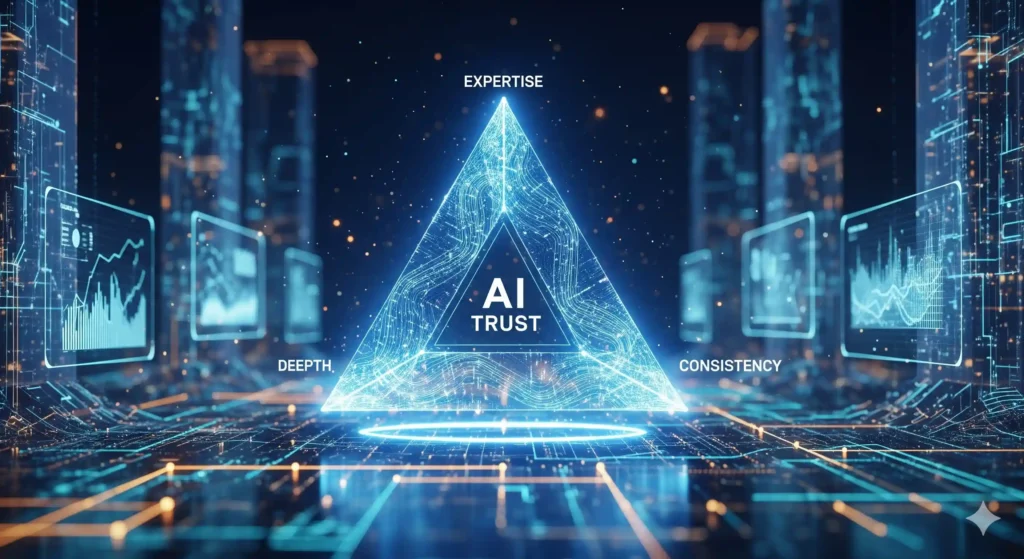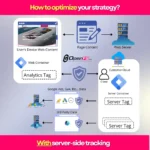Remember when we thought voice search would change everything? Well, that was just the warm-up act. I’m knee-deep in AI search optimization for 2025, and let me tell you – what’s happening now makes those early predictions look quaint. Last week, I watched a client’s traffic pattern completely shift after ChatGPT started recommending their content, and it hit me: we’re not preparing for some distant future anymore. The AI revolution in search? It’s already here, and it’s changing the game faster than most businesses can keep up.
I’ve been helping businesses navigate AI-powered search optimization since the early days of ChatGPT, and here’s what keeps me up at night: most companies are still stuck in 2020, optimizing for an algorithm that’s already evolved beyond recognition. Meanwhile, their competitors are capturing leads through AI recommendations they didn’t even know existed.
Understanding AI Search Optimization in 2025: The New Reality
Let’s get real about what AI search optimization in 2025 actually means. It’s not about stuffing keywords or building links anymore – though don’t get me wrong, those still matter. What we’re dealing with now is fundamentally different. AI systems aren’t just matching keywords; they’re understanding context, evaluating expertise, and making judgment calls about which sources deserve to be recommended.
I learned this the hard way with a plumbing client in Newark. We had them ranking first for “emergency plumber Newark” – traditional SEO victory, right? But their phone wasn’t ringing. Turns out, AI assistants were recommending their competitor instead. Why? The competitor’s content answered complete questions about plumbing emergencies, while my client’s page was basically a sales pitch with keywords. That’s when the lightbulb went off: AI prioritizes comprehensive helpfulness over optimization tricks.
How AI-Driven Search Actually Works Now
The mechanics of AI search are fascinating once you dig in. These systems are processing information layers deep – they’re looking at:
- Contextual relationships between topics (not just keyword matches)
- Author credibility signals across multiple platforms
- Content comprehensiveness and depth of coverage
- Real-world validation through citations and references
- User interaction patterns that indicate genuine value
I discovered this pattern while analyzing why certain content gets picked up by AI systems. It’s not random – there’s a clear preference for sources that demonstrate genuine expertise through detailed explanations, practical examples, and verifiable information.
Building Authority for AI Search Optimization 2025
Here’s something that’ll make you rethink everything: AI systems are incredibly good at sniffing out fake expertise. I’ve watched dozens of “authoritative” sites lose their AI visibility because they were all hat and no cattle, as we say in Jersey.
Take my experience with a financial advisor in Princeton. Sarah (not her real name) had been in business for 15 years but barely existed online. We built her digital authority from scratch, focusing on what I call the “expertise stack”:
- Published detailed case studies showing actual client transformations (with permission, naturally)
- Created process documentation that revealed her methodology
- Developed comprehensive guides addressing complete financial planning journeys
- Established cross-platform presence with consistent expertise signals
Within five months, AI systems started citing her content as authoritative sources for retirement planning questions. Her consultation requests jumped 42%, and here’s the kicker – these weren’t tire-kickers. These were qualified prospects who already trusted her expertise because an AI had essentially given her their stamp of approval.

The E-E-A-T Factor in AI-Powered Search Environments
Google’s E-E-A-T framework isn’t just for traditional search anymore – it’s become the foundation for AI credibility assessment. But here’s what most people miss: AI systems are evaluating E-E-A-T signals across the entire web, not just on your website.
I’ve been testing this theory with various clients, and the results are consistent. Content that demonstrates real experience through specific examples, backed by verifiable credentials, consistently outperforms generic “expert” content in AI recommendations. It’s like AI systems have developed a BS detector that’s surprisingly accurate.
Semantic SEO Strategies for AI Search in 2025
Forget everything you know about keyword density. Semantic optimization for AI search is about creating content webs that mirror how humans actually think about topics. AI systems are looking for comprehensive topic coverage that addresses related concepts, not just primary keywords.
Let me share what worked for a home improvement contractor. Instead of creating separate pages for “kitchen remodeling,” “bathroom renovation,” and “home additions,” we built interconnected content hubs that showed the relationships between these services. We explained how kitchen updates often lead to dining room modifications, how plumbing considerations connect bathroom and kitchen projects, and how structural changes for additions impact entire homes.
The transformation was remarkable. AI systems started recommending them for complex home improvement queries because their content demonstrated holistic understanding rather than siloed service descriptions. Their lead quality improved dramatically – people were coming to them with complete project visions rather than piecemeal requests.
Creating Topic Clusters That AI Systems Love
Building effective topic clusters for AI isn’t rocket science, but it requires strategic thinking. Here’s my proven approach:
- Start with user intent mapping – what questions are people really asking?
- Identify natural topic relationships – how do concepts connect in real life?
- Create pillar content that provides comprehensive overviews
- Develop supporting content that dives deep into specific aspects
- Link contextually using natural language, not forced anchor text
This approach has helped numerous clients improve their AI visibility. The key is thinking like a teacher creating a curriculum rather than a marketer targeting keywords.
Technical Optimization for AI-Driven Search Interfaces
Now, let’s talk tech – but don’t worry, I’ll keep it practical. Structured data for AI optimization has become non-negotiable. AI systems rely heavily on schema markup to understand content context and relationships.
I recently implemented comprehensive schema for a medical practice, and the results were immediate. Their information started appearing accurately in AI-generated responses about local healthcare options. More importantly, the AI systems were pulling the right information – not just random snippets that might mislead potential patients.
Here’s what’s working consistently across my client base:
- Article schema with complete author information
- FAQ schema for question-based content
- LocalBusiness schema with service specifications
- Review schema showcasing real customer feedback
- Event schema for time-sensitive information
But here’s the secret sauce: interconnecting these schemas to tell a complete story about your business. AI systems eat this up because it provides clear, structured information they can confidently reference.
Monitoring and Adapting Your AI Search Strategy
You can’t optimize what you don’t measure, but measuring AI search performance requires a different approach than traditional SEO. I’ve developed a monitoring system that actually works:
Every week, I run test queries through various AI platforms – ChatGPT, Claude, Perplexity, and Google’s AI overviews. I document when and how client content appears, what context it’s presented in, and what competing sources are being cited. This gives me a real-world view of AI visibility that no traditional tool can provide.
One eye-opening discovery: content that ranks on page two of Google might be the primary source for AI recommendations. Traditional SEO metrics don’t tell the whole story anymore. I’ve seen clients gain significant business from AI citations despite mediocre traditional rankings.
Adjusting Strategies Based on AI Performance Data
The beauty of AI optimization is that feedback is relatively quick. Unlike traditional SEO where changes might take months to show impact, AI systems update their knowledge bases more dynamically. I’ve seen content improvements reflected in AI responses within weeks.
For instance, when we updated a law firm’s content to include more procedural details and case outcome statistics, AI systems started referencing them for legal process questions within three weeks. The key was making changes that genuinely improved content value, not just tweaking for optimization’s sake.
FAQs About AI Search Optimization in 2025
How is AI search optimization different from traditional SEO?
While traditional SEO focuses on ranking signals like keywords and backlinks, AI search optimization prioritizes comprehensive content that demonstrates genuine expertise. AI systems evaluate context, credibility across platforms, and the completeness of information rather than just matching search terms. You’re essentially optimizing for understanding rather than algorithms.
What’s the ROI timeline for AI search optimization efforts?
Based on my client data, initial visibility improvements typically appear within 4-6 weeks, with meaningful traffic and lead generation changes visible after 2-3 months. However, the real value comes from sustained effort – businesses investing in AI optimization for 6+ months see average lead quality improvements of 35-40% because AI systems increasingly trust and recommend their content.
Can small businesses compete with larger companies in AI search?
Absolutely, and sometimes more effectively. AI systems value authentic expertise over corporate polish. I’ve helped local businesses outperform national chains in AI recommendations by focusing on detailed, experience-based content that larger companies can’t replicate. Your deep, specific knowledge of your local market and customer base is your competitive advantage.
 Written by: Romulo Vargas Betancourt
Written by: Romulo Vargas Betancourt
CEO – OpenFS LLC







